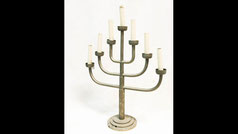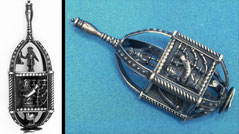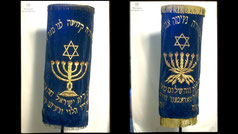ANCIENT AND NEW MENORAHS - 20th Century
This website shows historic menorahs from the twentieth century. Menorah illustrations from other centuries: Ancient Menorahs until the 1st century, 2nd century, 3rd century, 4th century, 5th century, 6th-10th century, 11th-13th century, 14th century, 15th century, 16th century, 17th century, 18th century, 19th century, 21st century. Coins and Medals

1888. Tomb monument of the family Monataro ("Tomba Montanaro"), Staglieno Cemetery in Genoa (Génova), made by Giovanni Battista Villa (1832-1899). The sculptor created this monument for Antonio Montanaro. It shows the "wise virgin" as she lights the light of the Menorah. A replica was created in Buenos Aires, Argentina (Dorrego-Ortiz Basualdo family mausoleum). Photo by Alfred Noack (1833-1895 "Genoa. Cemetery. Montanaro family grave (Vilia)". Link1, Link2, Link3, Link4

20th century (or end 19th century). The Dorrego-Ortiz Basualdo family mausoleum is one of the largest in Recoleta Cemetery in Buenos Aires, Argentina. Designed by French architect Louis Dubois according the sculpture by Giovanni Villa. The sculpture depicts the parable of the wise and foolish virgins as told in Matthew 25: Ten women diligently wait for the arrival a bridegroom to celebrate his marriage, but only five are prepared for the second coming of the Lord. Source: Link1, Link2, Link3

20th century. Dorrego-Ortiz Basualdo mausoleum, Cementerio de La Recoleta, Buenos Aires. A Latin cross is observed with the emblem of the 4 gospels at their ends. At the top is the inscription “O crux ave spes unica”, the first verse of a 6th century Roman hymn & translates to: "O hail the cross, our only hope." Source: Link1, Link2, Link3

1900 (ca.). A Judaic oil painting. Probably American. Of still life including a menorah and a scroll. Signed Czene Afatfoli. 18” x 24”. LiveAuctioneers 2015. Source: Link

1900-1950. Christ presented at the temple. Stained glass, watercolors. Design drawing for stained glass memorial window showing The Presentation with beatific figures, architecture, and menorah for Church of St. Michael and All Angels in Anniston, Alabama. Contributor Names: J. & R. Lamb Studios, designer. Source: Link

1900 (ca.). Goblet for Kiddush. Stamped silver. 2 parts, goblet and saucer. Persia. Goblet: height 9.5 cm, diameter 7 cm. Saucer: diameter 11 cm. Persian stamps. On the goblet is an engraving of the blessing for wine and beautiful decorations of a menorah, a Jewish Star, flowers and leaves. Matching reliefs of the decorations on the saucer. Winners Auction 2014, Auction No. 085. Source: Link

1903. Sefer Antiochus scroll. In rhyme. In the Persian language. Jerusalem. Levi printing house. Antiochus scroll – an ancient midrash aggada. The National Library of Israel. Source: Link

1904. "Darwin Evolution" Caricature from the Jewish magazine Schlemiel. This is not a 7-armed Menorah but a Chanukka; it shows how some Jews and Christians changed the light of the Menorah to the pagan lights of a Christmas tree by mixing of traditions. Chrismukkah (German: Weihnukka). Source: Link
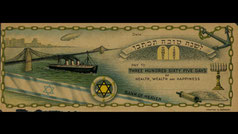
Early 20th century. "Shana Tova" ("Good year") card, colored lithograph. Germany. An Israeli flag can be seen within a ship's life ring, next to a Torah scroll, menorah of the Temple and the Luchot. A ship sailing to Palestine/Israel can be seen in the background, with the Zeppelin in the sky above. Text on the bottom: "Bank of Heaven" topped by the words "Pay To" with a blank line for the name and the amount: "365 days of health, wealth and happiness." Winners-Auctions, 94. Source: Link
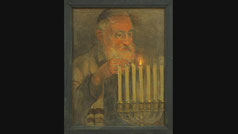
Early 20th century. Grandfather lighting menorah Judaica Holiday oil painting. A Rabbi lights the menorah in the Synagogue. Artist unknown. Dimensions: 21.5x17.25 in, 55x44 cm. Source: Link

20th century. Jewish scholar (Rabbi) in the interior teaching two boys, in the background Menorah candlestick. Oil on canvas. lower right partly illegible signed "Mar. Eliasz Lonczacki (?), probably a Polish painter. Source: Link

20th century. Jewish girl in Interieur with a menorah on the table. Oil on canvas, 78,5 by 98,5 cm. Unknown painter. Source: Link

Beginning of the 20th Century. Mizrach. Colorful. Handmade. Mizrah is the Hebrew word for "east" and the direction that Jews in the Diaspora face during prayer. In addition, "mizrach" refers to an ornamental wall plaque used to indicate the direction of prayer in Jewish homes. Source: Link

1906. The Jewish Encyclopedia does not show the form of the Mosaic menorah mentioned in the Bible with the 22 almond
blossoms, but a depiction according to the Talmud and a modern representation. Source: Link
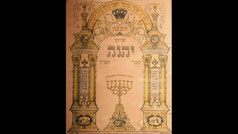
20th century (start). Shiviti plate. Jerusalem. Measurements: 50x40 cm. Leaf printed by colored lithograph. Illustration of Zion, Zechariah's Tomb, Tower of David, Western Wall, and Rachel's Tomb. Without name of printer. Winners-Auctions. Source: Link

20th century (start). Shana Tova postcard with texts from the High Holiday prayers. Hebrew and Hungarian. Stamped in Budapest and posted in 1914. A verse relating to Rosh Hashana. The Ten Commandments at the top, shofars, clouds and other motifs alluding to the giving of the Torah at Mt. Sinai, with two seven-branched menorahs and two cantors. Hungarian text at the bottom: "Boldog Ujevet" (year of bliss). Winner's Auction. Source: Link

1907. A rare Brit Milah embroidered and painted silk panel, Tangiers 1907, embroidered with an array of flowers and leaves, centered with a cartouche enclosing the Hebrew blessing and surmounted by a crown flanked by two putti with painted faces, a menorah below surrounded by two seated lions and depictions of Aaron and Moses, dated 5667 and signed with the initials FMP, 47 1/8 by 34 1/4 in. 120 by 87 cm. Sothebys. Source: Link

1908. Shivit Hashem L'Negdi'. Colored, poster synagogue decoration (Jerusalem). Made by Moshe ben Yitzchak Mizrachi. Rachel's Tomb in the upper right corner; tomb of Rabbi Meir Ba'al HaNess in the left corner. Menorah in the center, with the hymn למנצח בנגינות מזמור שיר. Source: Link

1908. The Shekinah Glory Enters the Tabernacle; illustration from The Bible and Its Story Taught by One Thousand Picture Lessons. Edited by Charles F. Horne and Julius A. Bewer. The word Shekinah does not occur in the Bible and denotes the dwelling or settling of the divine presence of God. Source: Link
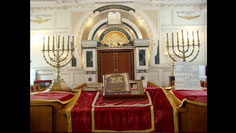
20th century. Synagogue Casablanca. The Morocco Jewish Museum in Casablanca is the only Jewish history museum in the Arab world. Half a century ago, more than a quarter of a million Jews lived in Morocco, coexisting peacefully with their Muslim neighbors. Today, only a handful remain. Source: Link

1912. Torah ark curtain for Yom Kippur, incorporating bride’s skirt. Cochin, India. Gilt-tinsel embroidery on silk. Dimensions: H: 23.6; W: 17.2 cm. Loan from the Moshav Ta'oz synagogue. The Israel Museum, Jerusalem. Source: Link

1912. Title page of a monthly Le Renaissance Juive. Drawing. Iconographical Subject: Noah's Ark, Menorah, Tablets of the Law, Lion, Magen David. Origin: Egypt, Cairo. Photograph Copyright: Center for Jewish Art. Source: Link

1913. The Old Synagogue (German: Alte Synagoge) is a cultural meeting center and memorial in the city of Essen in Germany. The memorial center was founded in 1980 and is accommodated in the pre-war Jewish community's synagogue. The synagogue, together with the attached Rabbinerhaus (House of the Rabbi), which today houses the Salomon Ludwig Steinheim Institute, was finished after a two-year construction period in 1913. Source: Link1, Link2, Link3
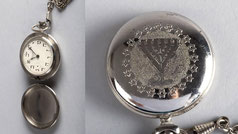
20th century. Pocket watch with Hebrew numeration. The cover that protects the dial features a double-danced Star of David that preserves blue paint inside. The star appears adorned by a vegetal fence that ends in the superior part with a crown and in the inferior one with the Hebrew word "shalom". On the back (reverse) is a menorah surrounded by 20 small stars of David. Iconography on the cover: Maguén David. Size: 4.60 cm; Weight = 89 gr, Chain: Length = 27,30 cm. Museo Sefardi, Toledo, Spain. Link

20th century. Candelabrum with seven arms or "Menorah". It has a base or octagonal base and a shaft with a central narrowing and divided into four bodies. From the last the central shank of the candelabra comes out branching three arms on each side. It can be used in any important Jewish ceremony: Saturday, wedding etc. Dimensions: Height = 36.50 cm; Width = 28 cm; Base diameter = 12 cm. Museum Sefardi in Toldeo, Spain. Source: Link

First half of the 20th century. Special Menorah candlestick, cast brass, screwed in several pieces, floral surface engraving. Dimensions: Height 32 cm. Mehlis Auktionen. Source: Link

First half of the 20th century. Cast brass menorah, screwed in several parts, decorated with festoons and palmettes, movable candlesticks, foot old soldered. Dimensions: Height 25.5 cm. Mehlis. Source: Link

20th century (?). Brass Shabbat Menorah. This old candlestick was someone's heirloom antique Eastern European menorah. It most likely is from Poland and is made of molded brass with 7 banded branches denoting a menorah used for The Sabbath or for everyday. The shamash sits atop a Star of David (Jewish Star). Rubylane. Source: Link

20th century. Adjustable brass altar candlestick holder. Heavy brass Menorah which accommodates up to 7 candles. Each side can be adjusted into three different positions and the central column also adjusts for height. Candle holder measures 18-25“ tall by 7.5" deep by 23" wide and weighs 8lb 14oz. Source: Link

20th century (or end of 19th century). Candelabrum menorah with light bulbs for electricity. Collection: Serbia, Sc_475, C25. Photographer: Zev Radovan. Photograph Copyright: Center for Jewish Art. Source: Link

20th century. Chandelier, seven-branched form. Metal, gold-plated. Electrified. 53x45cm. Bloss-Auktionen, Lot no.111, Art. no.2421-21. Source: Link

20th century. Electrified cast menorah: Cast metal lamp with bronzed finish, electrified. 27" high excluding bulbs x 24 3/4" x 9" base dia. LiveAuctioneers, 2010 Lot 0339. Source: Link

20th century. Electric menorah, candelabrum. Shiviti plaque (a plaque with the image of menorah and with the verse shiviti le-negdi tamid, Ps. 6:18). Sinagoga Israelita de Pinheiros Beth Jacob, Brazil. This image belongs to the documentation project of Myriam Szwarcbart. Center for Jewish Art. Source: Link

1914. The Golden candlestick menorah from the book by Stephen N. Haskell: "The Cross and Its Shadow." South Lancaster, Mass: The Bible Training School. Digitized by the Center for Adventist Research, James White Library, Andrews University. Interesting illustration, but the arrangement of almond blossoms on the Menorah is different than described in the book Exodus. Archive. Source: Link

1914-29. Hanukkah lamp with High Priest kindling the Temple Menorah and Bar Kokhba coins. Jerusalem, Israel, Sharar workshop, Bezalel. Brass sheet, stamped and soldered. Inscribed in Hebrew: "These lights are sacred". Dimensions: H: 26; W: 18.7 cm. The Israel Museum, Jerusalem. Source: Link

First half 20th century. Silver Hanukkah Lamp. The Menorah has almond blossoms. Place Made: Rome (?) Italy. Dimensions: 18 1/4 × 11 1/2 × 4 in. (46.4 × 29.2 × 10.2 cm). The Jewish Museum, New York. Source: Link
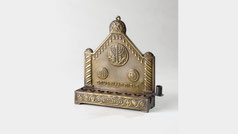
1914-29. Hanukkah lamp adorned with Temple Menorah and Bar Kokhba coins. Jerusalem. Sharar workshop, Bezalel. Brass sheet, stamped. Inscribed in Hebrew: "These lights are sacred" and "Bezalel Jerusalem". Dimensions: H: 16; W: 16 cm. The Israel Museum. Source: Link

Early 20th century (1905). Antique lion menorah. Rampant Lions of Judea flank Synagogue Menorah and Crown. Banded candlecups. Pair of full flowers above vase. Made by the Jewish Immigrant Metalsmiths on New York's Lower East Side. Source: Link

Early 20th century. Russia. Hanukkah lamp adorned with Temple Menorah flanked by lions. Lead, cast. Inscribed in Hebrew: nun, gimel, heh, shin, initials of the saying "a great miracle happened there". Dimensions: H: 11; W: 15.4 cm. The Israel Museum. Source: Link

20th century (ca. 1900?). Jerusalem. Hanukkah lamp made of glass beads. Glass beads, colored; cotton thread; iron wire; glass bowls. Inscribed in Hebrew: "To kindle the Hanukkah light" [blessing over the lights]. Dimensions: H: 34.4; W: 38.3 cm. The Israel Museum, Jerusalem. Source: Link

20th century. A Polish gilt-metal Hanukkah lamp menorah, Warsaw, signed Norblin & Co. Body decorated with palm trees and lions flank a menorah, topped by foliage ornaments and a crown of Torah; on the base eight candle or oil sockets, two servicing lights placed laterally. Dimensions: 29x24cm. Wannesgroup No. 64. Source: Link

1915-1920. Made by BEZALEL (or BETZALEL) art academy in Jerusalem. It is named for the Biblical figure Betzalel, who was appointed by Moses to oversee the design and construction of the Tabernacle (Ex 35:30). On the wall are a pair of lions holding a lamp and above them the inscription "These candles are holy". Source: Link

End of 20th century. Chanukah Menorah with raised back, decorated with lions, Star of David and more. On the base, eight candle holders and suspended shamash. Made in the style of the beautiful and famous model of Betzalel Jerusalem. Silver hall marked 925. Source: Link

1915. Homage address on the occasion of the 85th birthday of Emperor Franz Joseph I. (1830-1916; Emperor of Austria, King of Hungary) on 18 August 1915. Bringer: The Jewish refugee children from Galicia and Bukovina. German Text: "Ihrem lieben Kaiser, die jüdischen Flüchtlingskinder", translated: "To our dear Emperor, the Jewish refugee children." In the center leather inlay with menorah in front of double eagle and Habsburg crown. Österreichische Nationalbibliothek. Source: Link

1916. Sacrificing to Bel from "Myths and Legends of Babylonia and Assyria" by Lewis Spence (1874-1955). The biblical menorah was determined by God and should not be used in images adoring idols and false gods (demons).Please note that these images are extracted from scanned page images that may have been digitally enhanced for readability - coloration and appearance of these illustrations may not perfectly resemble the original work. Source: Link

1918. Banner of the Jewish Legion Veterans. A blue velvet banner, 132 x 86 cm., embellished with yellow and gold bands, metallic threads and silver sequins. The arched words "Jewish Legion Veterans" (also in Hebrew) and "E.E.F. Palestine" surround a large Star of David in the banner's lower half; "Royal Fusiliers" flanks the star. At top, a menorah stands upon a banner carrying the word "Kadimah" in Hebrew; at bottom are the dates "1915-1918." Christies, Sale 8105. Surce: Link
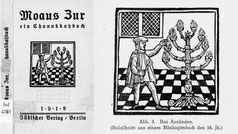
1918. Title of the book: "Moaus zur: Ein Chanukkabuch" (Moaus zur: A Hanukkah book) by Jewish publishing house, Berlin (Jüdischer Verlag, Berlin). The title page and page 115 show "The kindling" of a 16th-century menorah woodcut from a 16th century Minhagim (customs) book. The picture shows a menorah with eight arms, but a Minhagim from 1593, 1611 and 1662 (Amsterdam) shows a menorah with only seven arms or lamps. University Frankfurt am Main. Source: Link

1919-1921. Badge 42 mm X 35 mm. The Jewish Legion is an unofficial name used to refer to five battalions of Jewish volunteers, the 38th to 42nd (Service) Battalions of the Royal Fusiliers, raised in the British Army to fight against the Ottoman Empire during the First World War. Source: Link1, Link2, Link3, Link4, Link5

1919-1921. The Hamenorah periodical, published in Berlin and Vienna, was a semimonthly journal in Hebrew (with English Notes) for students of the spoken language. Contains Hebrew exercises, stories, photographs, sheet music and advertisements. Includes photographs of Palestine-Israel. This book serves as an excellent example of the international reach of Zionism in the early 20th century. Source: Link1, Link2, Link3

20th century. Ex libris of Dr. Tänzer with the seven armed candlestick. Aaron Tänzer (1871-1937) was an Austrian rabbi, chaplain and author. In World War I, he served as a Feldrabbiner (Jewish chaplain) in the German army. He got as military decoration the ribbon of the Iron Cross (das eiserne Kreuz) and a Star of David. Nevertheless, his wife was deported by the Nazis to the Theresienstadt concentration camp in 1942, where she died on 25 September 1943. Center for Jewish Art. Source: Link1 Link2 Link3

1920. Book Title: "Hebräische Melodieen" (Hebrew Melodies). Heinrich Heine (1797-1856) was a German poet, journalist, essayist, and literary critic. He is best known outside of Germany for his early lyric poetry, which was set to music in the form of Lieder (art songs) by composers such as Robert Schumann and Franz Schubert. Printed 1920 in Munich (München), 104 pages (with menorah image). Source: Link
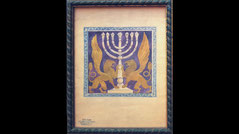
1920s. Israeli Art by Zeev Raban. Technique: Watercolor and pen on paper. Size: 17X17. Source: Link

1920-1930. Old Judaica religious school button with menorah from Poland before WWII. Obv: menorah. Rev: S.L.W. JEDNOSTAJNY - Warsaw manufacturer 1920's-1930's. Brass - 16,5 mm. Source: Link

1920s. The Tabernacle project. The Ancient Near East gallery (Glencairn Museum) features a scale model of the Tabernacle of Israel. Children from the Bryn Athyn Elementary School constructed this model in the 1920s under the supervision of Bishop George de Charms, whose book, "The Tabernacle of Israel (1969)," describes in detail the building of the model and the religious significance of the Tabernacle. Source: Link1, Link2, Link3, Link4

1920? Great Synagogue in Harlau (Hârlău-Domed) in Romania. Artist/Painter: Grünberg (Grinberg), Avraham Mendel (d. 1928). The painting depicts the interior of the tabernacle with its implements: the Ark of the Covenant, the Altar, the seven-branched menorah, the Table of shewbread and a variety of vessels from gold and porcelain. The artist used as a model an etching from the printing book Icones Biblicae (1625-1630) of Matthaeus Merian. Source: Link1, Link2

1921. The Talmud (Abridged) Part 1 on Tractate Berachot and Part 2. The jacket title page bears a picture of the Menorah in the Beit HaMikdash. Uncropped leaves in both volumes. Two sections of an abridged Talmud by Chief Rabbi Joseph Shapotshnick, London. Winner's Unlimited - No. 103. LiveAuctioneers. Source: Link1, Link2

1923. Title: Illustration from Dante's 'Divine Comedy', Purgatory, Canto XXIX. Color litho. Creator: Nattini, Amos (1892-1985). Nationality: Italian. Description: According Dante Alighieri (c.1265-1321), Italian poet. Bridgeman Images. Source: Link

1923. Magazin: "Menorah"- the Illustrated Monthly for the Jewish Home. The first 2 years of the magazine was issued in Vienna, Austria. Language is German, with some articles presented also in Hebrew and English. Source: Link

1924. Shlomo Yudovin, oil painting on canvas. Russia (?). In the center of this painting, in grisaille technique (shades of grey), a three-legged Menorah decorated with flowers and heraldic deer. In the background a wooden grille with spiral pillars. This theme is known from images on grave stones and from Russian or East European papercuts. Handwritten word in Hebrew ( not clear). In addition, an inscription in Russian, "copy of a wall painting in a museum in Berlin January 25, 1923. Source: Link

1925. LORIENTE SACRO L' ITALIA EGITTO PALESTINA GRECIA TURCHIA. Printed by Priulla Palermo, Italy, meant for use of tourists and travelers. A book in Italian which deals with the topography of the Land of Israel, Egypt, Greece and Turkey. Source: Link
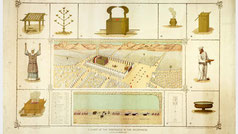
1925. Title: "A chart of the Tabernacle in the Wilderness". Old Testament posters with menorah by David Little. 59x91cm. Source: Link

1925. The menorah (a song): from Theodore Herzl; for solo, tenor or soprano, violin and piano; with 4 texts: Hebrew, Jewish, English and German, composed by A. Haitmann. Theodor Herzl (1860-1904) was convinced that Jews were a nation and therefore a Jewish state had to be founded. He became its thought leader, organized a mass movement and thus paved the way for the founding of Israel. He is considered the main founder of political Zionism. Source: Link

1927. Bereishit from Chumash Torat Shlomo [which is the written Torah with the explanations of the oral Torah] edited by Rabbi Menachem Mendel Kasher, Jerusalem 5687 [1927], First edition. Title page in Printed in honor of Rabbi Kasher. Printed in honor of Rabbi Kasher. Medallions in the corners show the Temple Mount, the Mediterranian sea, the menorah, the sun and the moon with fitting quotations from the midrashim of Chazal. Winners's Auction. Source: Link

1928. Letterhead of a letter from the journal Menorah to Prof. Dr. Simonsen in Copenhagen, Denmark. Writer: Norbert Hoffmann. Menorah, Illustrierte Monatsschrift für die jüdische Familie, Wien, Berlin. Source: Link

1928. German movie poster (95cm x 63cm). "Der Jazzsänger". Original Title (1927): "The Jazz Singer", directed by Alan Crosland and produced by Warner Bros. The film depicts the fictional story of Jakie Rabinowitz, a young man who defies the traditions of his devout Jewish family. After singing popular tunes in a beer garden he is punished by his father, so he run away from home. Some years later, now calling himself Jack Robin, he has become a talented jazz singer. ÖNB. Source: Link

1928. Torah ark curtain. Parokhet from the Italian Synagogue (Kal de los Frankos) in Istanbul, Turkey. Photograph Copyright: Center for Jewish Art. Source: Link

1928. Title: "Three one-act plays." Additional title: "Cripples, by David Pinski, translation from the Yiddish by Isaac Goldberg, Ph.D. '12." Yiddish theater programs. Publisher: Harvard and Radcliffe Menorah Societies. Author: David Pinski 1872-1959. Source: Link

1929. German magazine cover from: "Das Judentum in der Geschichte Schlesiens" (Translated: "Judaism in the history of Silesia." Info: Silesia was the eastern part of Germany, since 1945, the largest part of Silesia belongs to Poland). - In: MENORAH, 5-6/1929. "Jüdisches Familienblatt für Wissenschaft, Kunst und Literatur." Source: Link
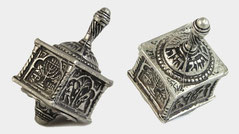
1929. Rare Bezalel Cast Led Pewter Hanukkah Dreidel (spinning top), Jerusalem. Made by Moshe Murro in Bezalel. Stamped in Hebrew “Nes Gadol Haya Sham” (a great miracle took place there). Each flank with one of the Hebrew letters of the dreidel “Nun”, “Gimel”, “Hey” and “Shin” and relevant Jewish scenes including a Menorah (inscribed Hanukkah in Hebrew) and the oil jug. Marked “M. Murro” and “Bezalel Yerushalem” in Hebrew and in English and dated 1929. Source: Link1, Link2
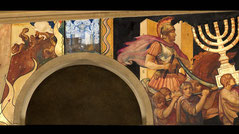
1929. Hugo Ballin: The Destruction of Jerusalem, Wilshire Boulevard Temple, Los Angeles. Mural Description From the Lectures of Rabbi Edgar F. Magnin, 1929-1930: "The Jews march captive out of Jerusalem bearing a golden Menorah or candlestick of the Temple. The candlestick depicted on this canvas was taken from the sculptural representation as shown on the Arch of Titus in Rome. Jerusalem was destroyed in the year 70 of this era by the Romans under Titus. Source: Link1, Link2
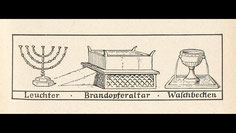
1929. The German Catholic School Bible shows the 22 almond blossoms on the menorah. Title: "Katholische Schulbibel für die Erzdiözese Köln". Düsseldorf: Schwann. Source: Link

1930. Pair of brass candlesticks Judaica. On the foot painted name "T4 / EU.Mgr", seven-branched menorah candlesticks, brass patinated, disc base, wavy shaft, fixed curved candlesticks with screwed grommets and drip cups. There is a special feature, because the middle lamp is on the side. Dimensions: Height 40 cm. Mehlis Auktionen. Source: Link

1930-35. Kindling of the Chanukah Lights. Colour illustration of a family gathered around the hanukah menorah. From 'Schaare Tephillah' (Gates of Prayer) Daily Prayer Book, in a revised translation by Reverend Abrahamsons, with colour 'illustrations by famous artists', published in Vienna. Publisher: Josef Schlesinger. Jewish Museum London (Catalogue number: 1357.8). Source: Link

1930. Song of Songs by Zeev Raban (1890-1970, Teacher in Bezalel 1912- 1929), one of the founders of the Israeli art world. The picture illustrates Song of Solomon 5:2-6. A naked young woman is sitting on a bed in a vaulted room and trying to cover her breasts with her right hand. At the sides of the picture are rectangles with "reliefs": a Menorah on the right side and twisted columns on the left. Photograph Copyright: Center for Jewish Art. Source: Link

1930. Standing Hanukkah Lamp by Ze’ev Raban artist, Israeli (1890-1970, born Poland). Dimensions: H. 35 1/2 in. (90.2 cm). This large lamp is one of the masterpieces of Jerusalem’s Bezalel School of Arts and Crafts, the first modern design school for Jewish ritual objects. The lamp takes the form of the menorah. However, two more branches have been added to allow for the required eight lights of Hanukkah plus the central server light (shamash). Source: Link1, Link2

1932. Chanukah Menorah opposite Nazi building in Kiel. Text on back of photo reads: "Chanukah 5692 (1932) "Death to Judah" So the flag says, "Judah will live forever" So the light answers." 1st December 1932. Jews loved their homeland Germany and were here, unlike other countries, free and economically very successful. But the rapid political changes in the 1930s ruined everything and destroyed not only Jewish but many German lives as well. Photo: Rachel Posner. Link1, Link2, Link3, Link4, Link5
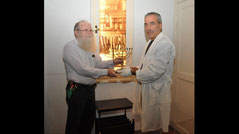
1932. Kiel Menorah, from the upper picture. Yehuda Mansbach [left] receives the Hanukka menorah from Michael Tal, [right] an artifacts curator at Yad Vashem. Yehuda brings his grandfather’s Hanukkah menorah home to his son, who was named for his great-grandfather, Rabbi Akiva Baruch Posner, the last rabbi of the Jewish Community of Kiel, Germany. After the holiday returns it to its place of honor where it is on display at Yad Vashem. Source: Link1, Link2, Link3

20th century. Brass tray with two menorahs. Busts of Herzl and Nachum Sokolov. Winner's Unlimited - No. 097. Source: Link

1933. Sabbath plate with menorah. Collection: Croatia Sc_408. Photograph Copyright: Center for Jewish Art. Source: Link

1937. Synagogue Interior. Painting by Mane Katz (1894-1962), Russia. Colorful painting of table with red cover, with two golden Menorahs and two open books, and a Mizrach hanging. Width 89cm, Length 116cm. Technique: Oil on canvas. Collection of the Mané-Katz Museum, Haifa. Source: Link

1942. Haggadah from the “Hebrew Traffic Unit” (“Yael”), of the Jewish Brigade of northern Africa. On Passover 1942, the Unit parked in Egypt, at the shore of the Red Sea. The Haggadah makes reference to the symbolism of the location and praises the role of the company soldiers as representatives of the Eretz-Israel settlement in the war against the Germans in northern Africa, in the framework of the Jewish Brigade. National Library of Israel. Source: Link

1943. Still-life with Torah Scrolls by Mane Katz, Russia. Table with objects: 7 armed Menorah, goblet, Torah crown, two Torah scrolls, with an open book on a prayer shawl. Dimensions: Width 195cm Length 130cm. Technique: Oil on canvas. Collection of the Mané-Katz Museum, Haifa. Source: Link

1945 (before). Hanukkah lamp found in rubble of Chancellery used by Hitler. Virginia Link and her husband Lt. Colonal Willard C. Link were in Berlin, Germany in 1947. During that time they visited the rubble of the German Chancellery with their friends Major William Ryan and his wife Matilda Ryan. Virginia walking through the rubble somehow noticed what appeared to be a brass object partially covered with debris. She recovered the item, returned home, cleaned it and kept it as a keepsake. Link

1948. Shiviti. Holocaust of Czenstochov Jews. Completely illustrated Shiviti plate. Oil and aquarelle on canvas. 53:67 cm. Made by Pinchas ben Ezriel Perkal, per the request of Moshe Chaim Glicksman from the Czenstochov community, in memory of his wife Kreindel bat Rina Miriam, his son Yaakov and daughter Perel who were all murdered in Treblinka on the Shemini Aseret holiday [1942]. The Treblinka labor camp is illustrated on the bottom of the plate, with the crematorium and the smoking chimneys. Winners-Auctions, 079. Link

1948. The Emblem of the State of Israel shows a menorah surrounded by an olive branch on each side. The State of Israel adopted the symbol after a design competition held in 1948. The image used on the emblem is based on a depiction of the menorah on the Arch of Titus. Source: Link

1950. Israel: a group of different vignettes for Israel Bonds from the American Banknote Company Archives, c. 1950: 1) Large (c. 9 x 6") black and white with a group of workers, menorah, cog & farm machinery in the background; 2) large & allegorical: woman studying w/pastoral scene in background on left & man (Moses?) sitting with two cherubs & eagle with a river and city behind, and State emblem in center. Source: Link

1950. "The Independence Hanukkah Lamp", two drawings by Ze'ev Raban (1890-1970) for a Hanukkah lamp produced by the Pal-Bell company. Pencil and ink on paper, Bezalel, Jerusalem. Above: In the center is the emblem of the State of Israel, alongside two figures: a soldier and a female pioneer, seated, with the national institutions and the Hebrew University buildings. Below: A triptych composed of depictions of the Maccabees' battles and the lighting of the Temple menorah. Source: Link

1950. Mizrah and Shiviti. Yad Vashem Lagola, Haifa, issued by "Chug Hovevei Omanut HaTanach." In the center appear the words "Mizrah, Shiviti Hashem Lenegdi Tamid." Paintings of the plan of the Temple, Menorah (very interesting shape), Half a Shekel, Synagogue of Rashi, Beit Midrash of the Besht in MedzhybizhAltnoi Shul, Jewish street in Vilnius and ruins of the great synagogue in Warsaw. Photographs of Jerusalem, Rachel's Tomb, model of the Second Temple... 35X24.5 cm. Kedem Auctions. Link

1950. Painting by Curt Brückner (=Curt Echtermeyer; 1896-1971), a German painter, active in Berlin. Title: "Rabbi in the interior." Portrait of a Jewish scholar, reading a book in the light of a menorah, minimal pastose genre painting, oil on hardboard, signed on the top right, framed, folding. Dimensions: 18 x 23 cm. The Saleroom, Lot 4295. Source: Link

1950. Design drawing for stained glass contemporary tondo window with flames and 7-branch Days-of-Creation menorah. Contributor Names: J. & R. Lamb Studios, designer. Stained glass, watercolors. Library of Congress. Source: Link

1950-1980. Design drawing for stained glass window showing Christ as child in Temple, with menorah, scroll, Alpha and Omega, and blank space for "lamp of wisdom". Watercolor, graphite, ink; mount size 10 x 8.25 in. Contributor Names: J. & R. Lamb Studios, designer. Source: Link
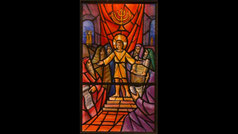
1950-1990. Design drawing for stained glass window showing young Christ in the Temple with menorah for St. Thomas of Canterbury Church in Smithtown, Long Island, New York. Contributor Names: J. & R. Lamb Studios, designer and Lowndes, Florin, designer. Stained glass. Gouaches. Library of Congress. Source: Link

1951. The menorah was interpreted by Henri Matisse (1869-1954; French painter) as a tree of life. Source: Link

1951. A memorial meeting for the Jewish victims in Dachau Concentration camp is held in front of a menorah and the Star of David, Jewish symbols. Photo: Erich Lessing (b. 1923), an Austrian photographer. He was born in Vienna into a Jewish family, the son of a dentist and a concert pianist. He immigrated 1939 to the British Mandate for Palestine (now Israel). His mother remained in Vienna and later died at Auschwitz. Österreichische Nationalbibliothek. Source: Link

1952. Jewish cemetery in Belgrade (Serbia). The approximately 10-metre high »Memorial to the Jewish Victims of Fascism by the architect Bogdan Bogdanović. Each wing bears a Hebrew quote and a Star of David, and located between the wings is the sculpture of a menorah. Source: Link

1953. Menorah on the first Hebrew edition of Anne Frank's diary (published 1 year after its English ed. and 6 years after the first Dutch ed.). Anne was a German-born (1929 in Frankfurt) diarist and one of the most discussed Jewish victims of the Holocaust. The diary has since been published in more than 60 languages. Source: Link1, Link2 (Edition from 1958 Link)

1953. The Holy Bible, Revised Standard Version, revised 1881-1885, 1901 and 1952. New York and Glasgow: Collins' Clear Type Press. London, Toronto, Sydney, Auckland. From a private collection of a wonderful Christian woman from Germany.

1950’s, American. Brass-plated metal Hanukkah Menorah owned by Marilyn Monroe (1926-62). She never had a real family of her own and was eager to join the family of her new husband, Arthur Miller, and so she converted to Judaism. She took the decision seriously, studying Judaic texts with the Miller family’s rabbi, Robert E. Goldburg. Height: 10.25 inches (26 cm); width: 9 inches (22.86 cm). Kestenbaum Auction 85, Nov. 07th, 2019, price: $90,018. Source: Link1, Link2
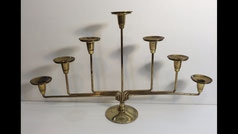
1955. Herman Berman Co. Art Brass 7 Arms Jewish Hanukkah Menorah, 13 1/4" Tall x 23" Wide, 2.10 Lbs Weight. It has the Monogram-"-Presented To-, Ann Zimmerman, District President, B' Nai B'Rith Womens Grand Lodge Dist. #4, 1955-1956, From Executive Board. Source: Link

1956. Expressionist Figures with Menorah. This oil on canvas entitled "Mourning" is by New York artist Jennings Tofel (1891-1959, American). Tofel was a friend of Georgia O'Keefe and Alfred Stieglitz. He received an art grant to work in Paris in the 1920s. His work is in the permanent collections of the Smithsonian and the Whitney Museum of American Art. Signed lower left. Gallery location: San Francisco, CA. Source: Link
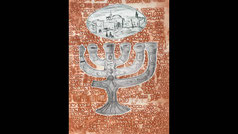
20th century. The Western Wall and a Menorah with Hebrew inscriptions. Color Etching by Zvi Milshtein. Dimension: 22 x 15". Zwy Milshtein is a French painter of Romanian origin. In 1934 he was born in the Moldovan city of Kishinev. He fled his native Moldavia before the Nazi invasion. Rubylane. Source: Link

1956. The Knesset Menorah is a bronze Menorah 4.30 meters high, 3.5 meters wide, and weighs 4 tons. It is located at the edge of Gan
Havradim (Rose Garden) opposite the Knesset. It was designed by Benno Elkan (1877-1960), a Jewish sculptor who escaped from his native Germany to Britain. It was presented to the Knesset as a
gift from the Parliament of the United Kingdom on April 15, 1956 in honor of the eighth anniversary of Israeli independence. Source: Link

1960. 25th Zionist Congress. The Official Poster 70x100cm, colored, depicting a stylized Menorah, by Kopel. Source: Link

1961. Ben Shahn (American, born in Lithuania; 1898-1969). Title: "We Kindle These Lights (Hanukkah)." Medium: Gouache, ink and gold leaf on paper. Dimensions: 20 1/2 × 26 13/16 in. (52.1 × 68.1 cm). Geography: Roosevelt, New Jersey, United States, North and Central America. Copyright: Art © Estate of Ben Shahn/Licensed by VAGA, New York. The Jewish Museum. Source: Link

1963. Samuel Helping in the Temple. Painting by Harold Minton. The Bible Story Book, Bethann Van Ness, Broadman Press, 1963. Now the boy Samuel was ministering to the Lord under Eli. And the word of the Lord was rare in those days; there was no frequent vision (1 Samuel 3:1). The Sunday School Board (S.B.C). Source: Link

1964. Book Title: Siddur tefilat Israel. Book of prayers for all the days of the Sephardic Community Hay. Published by the Sinai publishing house in Israel. Tapas richly decorated in gold on brown leatherette. Front zone: inserts in the tables of the Law, two winged and confronted lions that hold on their heads a "menorah". Rear zone: symbolic representation of the twelve tribes of Israel under the name that identifies them in Hebrew. Museum Sefardi, Spain. Inventory: 0292/007/2. Source: Link
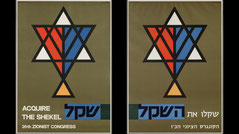
1964. Combination of the Star of David with a menorah in white, black, blue, orange on an olive-green background by Otto Heinrich Treumann (*1919 in Fürth, †2001 in Weesp, Netherlands), an internationally renowned German-Dutch graphic artist. Treumann grew up in a liberal Jewish home in Fürth, Germany. He emigrated with his family from the persecution by the German National Socialists in 1935 to Amsterdam. Joods Historisch Museum. Source: Link1, Link2, Link3

1965. Title: Menorah by BEN SHAHN (1898-1969), Kaunas, Lithuania 1899 - 1969 New York (American / Lithuanian). Technique: Original Hand Signed Silkscreen with Extensive Hand Colouring with Gouache and Applied Gold Leaf on Japan paper. Paper Size: 68.5 x 52 cm / 27 x 20.5 in. The work was published in 1965 in a very small edition of only 25 impressions of which only two were hand signed. Gilden's Arts Gallery. Source: Link

Post Modern Art Pottery Cactus 9-branch Hanukkiah Menorah, cactus fruit finials. Signed on base 'EP Pottery '95'. 6.5lbs Approx. Measurements: 14.5" wide x 14" height. LiveAuctioneers, Lot 0060, 2020. Source: Link

1966 (ca.). Cactus Candelabra or Cactus Menorah by Dina Frumin (1914-1981), Mexico. Dimesnions: 32h x 28w inches on 6.5h x 12w x 12d base, painted bronze, signed. LiveAuctioneers, 2009 Lot 0242. Source: Link

20th century. Cactus Hanukkah. Reb Kachina Lights His Menorah. The Reb Kachina evolved from a love of the Southwest as well as a devotion to Judaism. This uniquely popular blend of cultures provides a refreshingly humorous, yet reverent, view of traditions, history, laws and mysticism. This innovative watercolor series was created by renowned artist Harold A. Laynor (1922-1991), a prolific and innovative artist who left a legacy of art that encompasses thousands of paintings. Source: Link
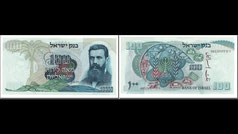
1968 (5728). Israel, 100 Lirot bank note. Menorah and symbols of the twelve tribes of Israel at left center. Blue and light green on multicolor underprint. Watercolor: Dr. Theodor Herzl at right. Bank of Israel. VCOINS. Source: Link

1970-1989. Newspaper Menorah Hanukkah by Curt Frankenstein Listed Chicago artist Print. Curt Frankenstein (1922-2009) was an American draftsman, painter and lithographer of German origin (Hannover). He had a Jewish father and a Protestant mother. Therefore, he had to leave Germany at the time of National Socialism and came via detours in the United States. Frankenstein showed his work at numerous Fine Art Fairs. Source: Link1, Link2
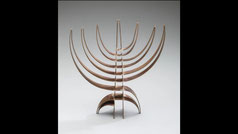
1970. Model of Menorah: "Fluid Line" by Artist/Maker Ludwig Yehuda Wolpert (American, b. Germany, 1900-1981). Place Made: New York. Medium: Copper. Dimensions: 10 7/8 × 10 1/2 × 3 in. (27.6 × 26.7 × 7.6 cm). The Jewish Museum NY. Source: Link
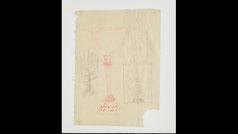
1970. Title: "Cup of Fulfillment with Burning Bush and Menorah." Artist/Maker: Ludwig Yehuda Wolpert (American, b. Germany, 1900-1981). Place Made: New York. Medium: Graphite and red ink on tracing paper. Dimensions: 9 3/4 × 7 1/4 in. (24.8 × 18.4 cm). The Jewish Museum NY. Source: Link

1972. Max Ernst (1891-1976) Untitled (Window) - German: "Bilderzyklus Judith" 1972 illustration for the volume Judith. "Tragödie in drei Akten." Stuttgart. Color lithograph on Arches paper. Source: Link

1972. Variations for the Menorah by Abraham Rattner. The Shema The Bush Was Burning With Jire but the Bush Was not Consumated. Abraham Rattner (1895–1978) was an American artist of Jewish origin, best known for his richly colored paintings, often with religious subject matter. During World War I, he served in France with the U.S. Army as a camouflage artist. Source: Link1 Link2

1976. Babi Yar memorials (incl. the Monument "Menorah" to the executed Jews) near Kiev (Ukraine). During WW2, German SS Einsatzgruppen and allied Rumanian units soon murdered over 33,700 Jews over two days in September. It was the the largest shooting massacre during the Holocaust. Upon pressure exerted by survivors and from abroad, a memorial was dedicated on September 29, 1976, the 35th anniversary of the murders. Source: Link1, Link2, Link3
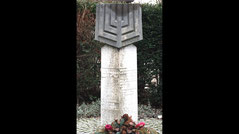
1970s: A Memorial stele in the form of a stylized menorah was erected to commemorate the Jews of Müllheim (Germany). The stele is framed by two low walls; the stones used for it are relics of the former synagogue building. "To commemorate their Jewish fellow citizens whose church stood in this place. The citizens of the city of Müllheim" (Zum Gedenken ihrer jüdischen Mitbürger, deren Gotteshaus an dieser Stelle stand. Die Bürger der Stadt Müllheim). Source: Link1, Link2

1977. Raya Sorkine: "Nature morte à la Menorah" - Pastel original signé - 1977. Dimensions : 64 x 49 cm. Galerie Les Artistes Témoins, Maxeville, Lorraine, France. Source: Link

1977. Spiritual Menorah painting, 24 x 18 cm. Felix Samuel Pfefferkorn was born in January 1945 in Berlin. His parents were killed in a bombing raid. The orphaned child grew up with friends of the parents. At the age of 14, the young Pfefferkorn went to Paris at the suggestion of a friendly American soldier. Here he learned the painter's craft. In the beginning of January 1980 he left to emigrate to the USA, since then there is no sign of life from him anymore. Source: Link

1980. Title: Menora. Artist: Jonasz Stern (Polish, 1904–1988). Medium: collage, oil on canvas. Size: 110 x 70 cm. (43.3 x 27.6 in.). ARTNET. Source: Link

1981. Gilt Bronze and Marble Menorah Sculptures. Artist: Salvador Dali (1904-1989), a Spanish surrealist artist. The pair each having seven molded arms, middle standard with figured head of Moses above Star of David, below to Dali signature bound by Hebrew inscriptions above and below, raised on stepped marble base engraved "JERUSALEM STONE" with additional Hebrew script. 19-5/8 inches high x 11-7/8 inches wide (49.8 x 30.2 cm). Imaged by Heritage Auctions, HA.com. Source: Link

20th century. Shalom Menorah (Peace Menorah) by Yaacov Agam, Israeli (b. 1928). Gold-plated kinetic sculpture, is an expressionist menorah, that reads "Shalom" in Hebrew when configured a certain way. The various arrangements allow the viewer to take part in the artistic experience. Size: 18 x 11 x 1 in. (45.72 x 27.94 x 2.54 cm). Agam is an Israeli sculptor and experimental artist best known for his contributions to optical and kinetic art. Source: Link1, Link2
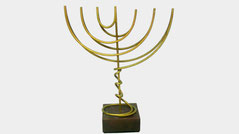
20th century. 24k Gold Plated Brass Menorah Sculpture, Judaica by Yaacov Agam (b. 1928). The seven light menorah is set on a square bronze base and made of 24k gold plated brass branches and stem. Hand signed - Agam. Size: Height - 19cm / 7.5in. Yaacov Agam was born Yaakov Gibstein in Rishon LeZion, then Mandate Palestine. His father, Yehoshua Gibstein, was a rabbi and a kabbalist. In 1951 Agam went to Paris, France, where he still lives. Source: Link

1982. A memorial stone commemorates the former synagogue of Biblis (Hessen, Germany). Beneath a stylized menorah is the short inscription: "In Memory of the Synagogue in the Enggasse 6, 1832-1938" ("Zur Erinnerung an die Synagoge in der Enggasse 6. 1832-1938"). Source: Link

In 1983, the city of Ober-Ramstadt (Kreis Darmstadt-Dieburg; Germany) built a memorial for the Jewish Nazi victims at the location of the synagogue, which was burned in 1938; below a stylized menorah are the words: "Here stood the synagogue of our Jewish fellow citizens. It was destroyed on 8 November 1938 by arson. Thou shalt not be vindictive, nor wrath against the children of thy people. Thou shalt love thy neighbor as thyself (Leviticus 19:18). Source: Link1, Link2

1984. Book of Exodus. Biblical illustrations by Jim Padgett, courtesy of Sweet Publishing, Ft. Worth, TX, and Gospel Light, Ventura, CA. Source: Link

1986. When John Paul II visited the Great Synagogue of Rome on 13 April 1986, the artist Georges de Canino painted two dishes, one for John Paul II and the other for Rabbi Elio Toaff, with the menorah motifs on them. Together they were the “Menorahdella pace” (Menorahs of Peace). His pieces are also on display in the Vatican Musuems. The symbolism in the “Menorahdella pace” as they are very similar to the painting “Menorah” given to Pope Francis 2016. Source: Link1, Link2

1986. Instead of the "Reichsfenster" destroyed by bombs in 1945, the "Israel window" was created in the Lutheran church in Ulm Münster (tallest church of the world) in memory of the destruction of the Jewish community. Made by Hans Georg von Stockhausen (1920-2010; Ex soldier in Stalingrad). Source: Link

1988. At the site of the former synagogue in Dessau (Germany) a sandstone stela with menorah was erected in November 1988; a short text commemorates the persecuted Jews of the city (translated): "The Jewish men, women and children who fell victim to the Nazi terror of 1933-1945" (German text: "Den jüdischen Männern, Frauen und Kindern, die dem Naziterror von 1933 bis 1945 zum Opfer fielen"). The synagogue was built in 1908 and destroyed in 1938. Source: Link1, Link2

1988. 65th anniversary of the bombing of Freiburg 27.11.1944. University Church. Seven-armed candlestick by Franz Gutmann from the Münstertal valley. Friday, 27 November, is the 65th anniversary of the day when the old Freiburg collapsed. The bomb war started by Germany had come over the city with all its brutality: Between 19.45 and 20.13, about 300 Royal Air Force planes unloaded their load of 20,000 bombs over the city. Almost 3000 people died, almost 10,000 were injured. Link

20th-21st century. Phillip Medhurst Apocrypha. The Sacrilege of Antiochus. 1Maccabees cap 1 Loutherbourg. Medhurst was born in Leicester, England in 1948. Medhurst's purchase and collation of prints illustrating the Bible ("The Phillip Medhurst Collection"), now housed at Belgrave Hall Leicester. Source: Link

20th-21st century. The Phillip Medhurst Picture Torah 431. The sacred furniture of the Tabernacle. Phillip Medhurst Collection at St. George's Court, Kidderminster. Please see also the original picture from the 18th century. Source: Link

20th-21st century. The Phillip Medhurst Picture Torah 478. The menorah and altar of incense. Exodus cap 39 vv 37-38. Mortier. A print from the Phillip Medhurst Collection at St. George's Court, Kidderminster. Please see also the original picture from 1703. Source: Link

20th-21st century. Phillip Medhurst Bible: Inside the tabernacle. Exodus 40. Neagle. A print from the Phillip Medhurst Collection at St. George's Court, Kidderminster. Source: Link

20th-21st century. A print from the Bowyer Bible (please see above the year 1792), a grangerised copy of Macklin's Bible in Bolton Museum and Achives, England. Photo: Harry Kossuth. Text: Phillip Medhurst Bible. Source: Link
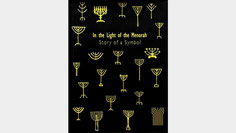
1989. Exhibition Israel Museum, Jerusalem. Opening on Israel's 50th Independence Day, the exhibition In the Light of the Menorah - Story of a Symbol followed the manifold incarnations and interpretations of the 7-branched candelabrum, from biblical sacred object to national emblem. Source: Link

20th century (end). Jossi (Yossi) Stern (1923-1992), known as "the painter of Jerusalem", Original Enamel Painting of Temple Menorah.This painting is from the Lawrence Collection curated by Jack Prager Studios, San Francisco, as seen on the studio label pictured. Painting site area: 7.75" tall x 9.75" wide; framed area: 15" tall x 17" wide. Stern was a a Holocaust survivor from Hungary, he came to Israel alone in 1940, when he was 17, on the illegal immigrant ship, Sakariya. Source: Link

1990. The »Menorah in Flames« (»Menora u plamenu«) Memorial by Nandor Gild (1924-1997) has since 1990 commemorated the approximately 9,000 Belgrade (Serbia) Jews who were murdered by SS and army units or deported to concentration camps under the German occupation between 1941 and 1944. Source: Link

1992. Fiddler's Menorah by Arman (Armand Pierre Fernandez, 1928-2005), a French-American artist. Bronze with brown patina. Dimensions: 18 x 19 x 6-1/2 inches (45.7 x 48.3 x 16.5 cm). Incised: "Arman, pour les amis du musee de Jérusalem" ("Arman, for the friends of the Jerusalem Museum"). Imaged by Heritage Auctions, HA.com. Source: Link1, Link2

20th century (late). Jay Strongwater enamel and Swarovski crystal menorah. Very ornate menorah featuring a central foliate and floral motif. Entire piece is made from metal with a multi colored enamel overlay. The base is comprised of leaves, flowers, and pedals which climb up the main stem splitting into nine branches. At the end of each branch is a flower in full bloom. Littered with Swarovski crystals throughout. Jay Strongwater plaque underneath base. Origin: USA. H: 8.25" L: 6.75". Source: Link

1992. In Küps (Kreis Kronach, Germany) existed from the 16th century until about 1890 a Jewish community. Since 1597 there was a Jewish cemetery. The oldest known tombstone dated from 1611. The tombstones were removed in 1939 and have not been found since. On the cemetery site since 1990 is a large memorial stone and a menorah of stone. The monument is a work of Kronacher sculptor Heinrich Schreiber. Source: Link

1993-2000. Michal Na'aman (born 1951), Trees of light, Golden showers, lithograph and Oil on canvas, mixed media and collage on cardboard; Israel Museum, Jerusalem. Michal is an Israeli painter. From the point of view of values, her work is characterized as conceptual art and deals with such subjects as the limitations of language and sight, the possibilities for expression, and gender issues. Link1, Link2, Link3

1993. Robert Wagner's Menorah image. "With his talent for placing Biblical scenes in modern landscapes, Wagner's painting (completed in 1993) evokes the cremetoria chimneys of Auschwitz, the Jewish menorah, and the sacrifice of Christ (himself a Jew) for and with his people." The Ashmolean Museum. Source: Link1, Link2

1995. Menorah on the sculpture "Block der Frauen" (Boulder of Women) by Ingeborg Hunzinger. A memorial for women. There was a collective street protest on Rosenstraße ("Rose street") in Berlin during 1943. This demonstration was initiated and sustained by the non-Jewish ("Aryan") wives and relatives of Jewish men who had been arrested for deportation. The protests, mainly led by women, continued until the men being held were released. Source: Link1, Link2

1995. Menorah by Artist: Mark Podwal (American, born 1945). Medium: Gouache and colored pencil on paper. Dimensions: 14 x 11 1/8 in. (35.6 x 28.3 cm). MET-Museum. The number of almond blossoms does not meet the biblical standards, because the Menorah from the book Exodus had 22 almond blossoms. Source: Link

1998. A modern menorah in front of the entrance of the Ben Gurion Airport in Tel Aviv, built in 1998 after a work by Salvador Dali (1904-1989) in 1981. The shape of the candelabrum does not meet the requirements of the book Exodus (more info). The Ben Gurion Airport near is the main international airport of Israel. Source: Link

1999-2015. Many crop circles (so called „Devils Twist“) appeared especially in England and some have the form of a cabbalistic menorah. Often the creation by humans could be proved. However, the Bible teaches us the existence of demons, which
can also appear as aliens to deceive people. Source: Link1, Link2
Menorah pictures from other centuries:
Until the 1st, 2nd, 3rd, 4th, 5th, 6th-10th, 11th-13th, 14th, 15th, 16th, 17th, 18th, 19th, 21st Century
Note: It's nice to see the menorah pictures. However, according to the Bible Jesus (Hebrew Yeshua) is the true spiritual meaning behind the physical Menorah. He is the true and eternal spiritual
light: "I am the light of the world. Whoever follows me will never walk in darkness, but will have the light of life" (John 8:12). The menorah also symbolizes the Tree of Life, because
Jesus is the way to life: "I am the way, and the truth, and the life. No one comes to the Father except through me" (John 14:6). Jesus' Word and the Bible are the light in this world. "Your word is a lamp to my feet and a light to my path" (Ps
119:105 and John 1:1-17).
Copyright info and disclaimer: All content and all photos from ancient and new menorahs provided on this website is for informational purposes only. It is not allowed to publish photos from this website on other websites or printed literature. Please always use only the original sources of the photos. We make no representations as to the accuracy or completeness of any information on this website or found by following any link on this website. We will not be liable for any errors or omissions in this information. We will not be liable for any losses, injuries, or damages from the display or use of this information. We can not guarantee the validity and accuracy of the information, please always check the original source. The opinions expressed from other website owners and those providing comments are theirs alone, and do not reflect the opinions of us.


